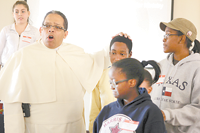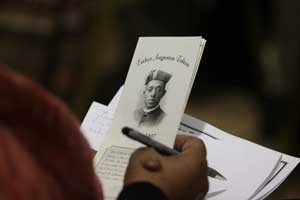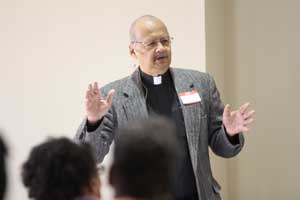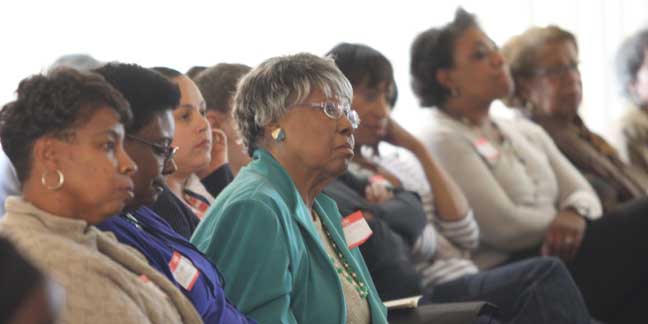 Life of Father Tolton, his family held up as example
Life of Father Tolton, his family held up as example
HICKORY — Black Catholics must learn and embrace their history if they want to serve Jesus Christ and His Church in a more profound manner when facing the challenges of today.
That was one of the messages from Rev. Canon A. Gerard Jordan of Daylesford Abbey in Paoli, Pa., and Deacon Curtiss Todd of Our Lady of Consolation Church in Charlotte during a Day of Reflection Nov. 19 at the Catholic Conference Center, hosted by the Diocese of Charlotte’s African American Affairs Ministry in honor of Black Catholic History Month.
The annual event drew more than 125 people from parishes in Asheville, Charlotte, Greensboro, Monroe and Winston-Salem.
Pictured: More than 125 people from across the Diocese of Charlotte, including Naomi McDowell Byrd from Our Lady of Consolation Church, participated in a Day of Reflection at the Catholic Conference Center in Hickory, sponsored by the diocesan African American Affairs Ministry. The program featured a talk by Rev. Canon A. Gerard Jordan of Daylesford Abbey in Paoli, Pa., who spoke on the life of Father Augustus Tolton, the Church’s first recognizable African American priest. Father Jordan is pictured below with Our Lady of Consolation Church’s Youth in Action members Jovanka Gonzalez, Catherine Hill, Chimmy Oduh, Amily James and Anthony Duliepre (behind James). (Photos by Patricia L. Guilfoyle, Catholic News Herald)
Father Jordan serves as special assistant to the postulator heading up the cause of sainthood for Father Augustus Tolton, the Church’s first recognizable African American priest.
Father Jordan gave a detailed account of Father Tolton’s life, even enlisting young audience members from Our Lady of Consolation Parish’s Youth in Action group to portray members of the Tolton family as he told his stories.
 Using St. Paul’s Second Letter to the Corinthians, 4:7-11, as the theme for his talk, he encouraged participants to look to Father Tolton and his family as an example of Christian witness.
Using St. Paul’s Second Letter to the Corinthians, 4:7-11, as the theme for his talk, he encouraged participants to look to Father Tolton and his family as an example of Christian witness.
Augustus Tolton was born a slave in 1854 on a plantation near Brush Creek, Mo. His father left to join the Union Army during the Civil War. In 1862, his mother escaped with her three children by rowing them across the Mississippi River and settling in Quincy, Ill.
She insisted on raising her family Catholic in their new home, and the entire Tolton family became active in their parish. Young “Gus” showed great devotion to God at a young age, but he had to leave one Catholic school because of threats of bullying. He found a haven at St. Peter Parish and School, where he learned to read and write and was confirmed at age 16.
He was encouraged to discern his vocation to the priesthood by the local foreign-born white priests. The Franciscans who taught him at St. Francis College (now Quincy University) helped him gain acceptance to a seminary in Rome, since none in the United States would accept him. He was ordained for the Propaganda Fide Congregation in Rome in 1886, expecting to become a missionary in Africa. Instead, he was sent back to Quincy, where he eventually served as pastor in one of the local parishes. There he endured racism, physical threats and abuse from white parishioners and fellow clergy until he moved to the Archdiocese of Chicago in 1889.
In 1894 Father Tolton spearheaded the building of St. Monica Church for the growing number of black Catholics in Chicago. He became widely popular for his service to the poor, his preaching, and his commitment to ministering to Catholics of all ethnicities and backgrounds. Working himself to exhaustion, he died on July 9, 1897, at the age of 43, after suffering heat stroke upon returning home from a retreat for the priests of the archdiocese.
Father Tolton is among four black Catholics celebrated in the African American Catholic community whose sainthood causes have been opened. The Vatican is now reviewing the 3,000 pages of documents from Church and civil archives on Father Tolton’s life, as well as documentation for two reported miracles attributed to his intercession and over 50 sworn testimonials of people who say they received a divine favor through his aid.
Through his detailed investigation into Father Tolton’s life, Father Jordan said he has been inspired by the priest in his own ministry as the first black in his abbey community just outside Philadelphia.
“It was his knowing and his love for the Gospel that spilled over into my life,” Father Jordan said, enabling him to overcome the racism and other obstacles he experienced on his own journey to the priesthood.
Father Tolton’s spirituality flowed from the Eucharist, Father Jordan noted. “Everything he did started from the altar.”
Today, he continued, black Catholics must be strengthened by the sacraments, especially the Eucharist. Attending Mass, and insisting that one’s children also go to Mass, is about getting spiritual nourishment that “allows us to be renewed so we can make it six more days out of the week,” he said.

 Deacon Curtiss Todd from Our Lady of Consolation Church in Charlotte speaks to the group.Daily prayer and the cultivation of silence are also important to deepening one’s relationship with God, he said.
Deacon Curtiss Todd from Our Lady of Consolation Church in Charlotte speaks to the group.Daily prayer and the cultivation of silence are also important to deepening one’s relationship with God, he said.
And just as Father Tolton and his family did, black Catholics today must apply their faith in every aspect of their lives, he said. Serving the parish in various ministries such as lectors or parish council members, helping the poor with more than just an occasional hand-out, educating and motivating young people, respecting and remaining close to one’s elders -- these are responsibility of every Catholic, but especially for black Catholics.
“Because (his spirituality) was rooted in the Gospel,” Father Jordan said, Father Tolton “took his success and remained faithful ... Quit teaching your children to be successful. Teach them to be faithful. We have lost that. Y’all want them to be doctors and lawyers and judges and priests and nuns, and you say, ‘Be successful. Make momma and daddy proud.’ Teach them to be faithful no matter where they are in life.”
The Tolton family and the religious who taught the young boy were essential to his becoming a priest despite all the odds, Father Jordan said. He pleaded with people to encourage religious vocations among young men and women today.
“It took a whole community to get this man to Rome to study and endure the bigotry and racism and hardships of life, but he got there – and it wasn’t on his own,” he said.
“Your first church is your household. You’re the pastor. Your very first school is your household. You’re the teacher,” he emphasized.
He said Father Tolton and his family serve as an example to all black Catholic families today, to encourage them to keep moving on their path to holiness. That heritage must be honored by learning about and living one’s faith, he said.
“It was families like his and others who allow us to worship in the church of our choice, the church of our baptism! You’re not there just because your mama signed you up. You’re not there just because you got a house in the neighborhood. You’re not even there because you bought the bricks and mortar that built the place. You’re there because of your ancestors who honored their baptism! Somebody say ‘Amen!’” To which everyone enthusiastically replied, “Amen!”
Father Jordan entreated participants to take what they learn and “use it in your ministry ... or you’ve wasted your time.”
Father Jordan’s account of the life of Father Tolton was “very interesting, very inspiring,” said George Desmond of St. Benedict the Moor Church in Winston-Salem.
The day’s program also included a talk by Deacon Curtiss Todd, former vice chancellor of the diocese, who spoke about black Catholic identity and the need for black Catholics to make their voices heard in the Church and in the wider community. He lamented the lack of diversity in Church leadership, including in the Charlotte diocese, and he chastised black Catholics’ inaction and negligence in fulfilling their baptismal call.
The Catholic Church is not exclusively a white, European domain, Deacon Todd noted, nor has it ever been. He said black Catholics must learn their history – including learning about black saints and the Church’s African popes – so that they may claim their rightful place in the Church today, combat the injustice and racism that are endemic in society, and pass this rich heritage down to the next generation.
The Day of Reflection was “fantastic,” said Mary Abbott, a member of Our Lady of Consolation Church in Charlotte.
“Amazing,” echoed fellow parishioners Naomi McDowell Byrd and Catherine Gomez, who also serves as a board member with the diocesan African American Affairs Ministry.
— Patricia L. Guilfoyle, Editor
Related stories:
Black Catholic popes, saints and leaders
Celebrating Black Catholics yesterday and today
Did you know?
On July 24, 1990, the National Black Catholic Clergy Caucus of the United States designated November as Black Catholic History Month to celebrate the history and heritage of black Catholics. November is significant because two important black saints are commemorated within the month: St. Martin de Porres’ feast day (Nov. 3) and St. Augustine’s birthday (Nov. 13). With All Saints and All Souls’ Day, we also remember the saints and souls of Africa and the African Diaspora.
Learn more
At www.nbccongress.org: Learn more about the National Black Catholic Congress and its upcoming events, download educational resources and get vocation information



 Life of Father Tolton, his family held up as example
Life of Father Tolton, his family held up as example